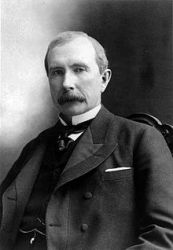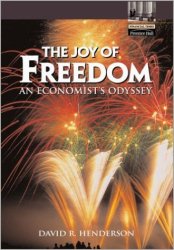Interview conducted at Rockford University by Stephen Hicks and sponsored by the Center for Ethics and Entrepreneurship.
Hicks: I’m Stephen Hicks, here at the Center for Ethics and Entrepreneurship with Dr. David R. Henderson, an economist visiting from the Naval Postgraduate School in Monterey, California. 
Dr. Henderson is the author of many books and articles, notably The Joy of Freedom, a semi-biographical exploration of economic themes and his career. Also The Concise Encyclopedia of Economics, a widely-used textbook in economics available both online and in print. Dr. Henderson was here to speak on the seven myths of free markets. Actually, on seven myths of free markets, leaving open that there might be more.
You mentioned that economics has the moniker the dismal science, but people don’t often know the actual origin of that. What is the story there?
Henderson: Yes, and the origin is fascinating. The way most people or most economists who think of themselves as informed think is that it came from Thomas Robert Malthus because he was dismal. He thought, two-hundred years ago in his essay on population, that agricultural output could grow only arithmetically and that population would expand exponentially, and, therefore, we would have mass starvation. That turns out not to be the reason at all. The term was coined by Thomas Carlyle, a British anti-capitalist author in the early 19th century. And his objection to economics — you have to remember, economics was dominated by very free-market economists at the time, two-hundred years ago — as that those free-market economists who dominated economics strongly opposed slavery. So Carlyle is saying economics is dismal because economists oppose slavery.
Hicks: You then proceeded to the seven myths with respect to the free market — how people think and evaluate free markets. This is important because it leads to lots of policy issues. We can run through the seven. The first one ties into Carlyle’s anecdote that free markets, in some sense, promote racism. What do you think about that one?
Henderson: Yes, that’s the myth. And, in fact, free markets undercut racism. This is the typical case people think of when they think about markets and racism. Think of a white employer who is faced with the chance of hiring a black employee who is productive, but because this employer is racist, he says, ‘No’. Free markets make him bear a cost for that action because if he gives up the chance to hire a productive black employee he gives up the potentially profitable opportunity. It doesn’t mean he won’t do it, but it does mean that it will make him bear a cost, and, therefore, the employers who come to get bigger market share are the ones who are the least racist because they are making out best financially. And that, then, gives an incentive even to racist employers not to care as much.
Hicks: Okay, so the less racist employer will hire the black employee, get the productive worker, and then will have a competitive advantage against the less tolerant employer.
Henderson: Exactly. And, in fact, governments were the ones that promoted racism. And the example I mentioned in my talk was street car companies, which one-hundred years ago in the South, were required by law to segregate by race. They had been segregating, but they had segregated smokers from non-smokers. And they were required, instead, to segregate by race, and they fought those regulations tooth and nail until the government got harder and harder on them and they finally gave up.
Hicks: What you call the second myth is the standard slogan, “The rich get richer under free markets and the poor get poorer under free markets.”
Henderson: Right, and it’s half-truth. The rich get richer, the poor get richer, and the in-between get richer. What I would point out is that, if you look at what Rockefeller, the richest man in the world one-hundred years ago, he had stuff that all but our very poorest people have. College students with very little money have cellphones, but he didn’t have that. He couldn’t fly very many places for most of his life. He couldn’t telephone people from most of his life. And then, even more important, if he got sick he couldn’t use penicillin or any other drugs because almost no other drugs existed. And that was key.
Hicks: So, the rich get richer and the poor get richer as well under free markets. Other standard criticism is the dynamic of free market capitalism is to lead to monopolies, and monopolies have various economic pathologies. What about that one?
Henderson: Yeah. Actually, free markets break down monopolies, and the reason is that when there is a monopoly, the monopoly is making money. Those high profits attract new entrants into the industry the way honey attracts ants. So monopolies under free markets tend to be temporary until some better competitors or better product comes along. And an example is the Blackberry, which now is being displaced by the iPhone. What’s interesting is that the Federal Trade Commission was suing Apple for a while on the grounds that they were dominating and whoever gets there first dominates. Well, that’s absurd, because the people who got there first were Blackberry.
Hicks: Okay, fair enough. Capitalism or free markets are bad for the environment. Another myth?
Henderson: Another myth because, in fact, what’s bad for the environment is socialism, because no one has an incentive to care for the environment under socialism. Property is not privately owned, so no one has an incentive to care for it. I have a chapter in my book, The Joy of Freedom, entitled “The Environment Owned and Saved,” and the idea is that if you own something you tend to take good care of it. Imagine we can do time travel and travel around the world: what we will find is that in 1990, before the former Soviet countries had a chance to develop out of socialism, you saw pollution. You saw lakes that were destroyed. The Soviet Navy had dropped nuclear waste in the ocean on purpose. If you go to Africa in this time travel, you find that the countries that have the strictest poaching laws are losing the most elephants. But the ones that have poaching laws and also allow the local villagers to share in the benefits from the tourism that elephants give rise to — those villagers have an incentive to then watch out for poachers, and those elephant populations are growing.
Hicks: The time travel argument is a kind of historical argument. If you look at the nations that are more socialistic, the environmental record is terrible. In the more free-market countries that have property rights, the environmental problems are either solved or less severe.
Henderson: Yes, solved or less severe is completely accurate.
Hicks: Okay. Free markets lead to war. Another standard one?
Henderson: Yeah, in fact, trade promotes peace because part of free markets is free trade across borders. And if two countries have a lot of trade, they have an incentive not to make war. It was interesting that when there was the big conflict between the United States and China in the first couple of months of the Bush administration, when the Chinese forced a U.S. Navy plane down and they were held prisoners for about a week to two weeks, the multinational corporations went to Bush and said, “However you resolve this, don’t do it by making war, because China is a great trading partner and we want to keep that going.” And it was resolved. In fact, these two economists found that the larger the interaction or the larger the amount of trade between two countries, the lower the probability of conflict is.
Hicks: Interesting. Another myth you call the “Stinginess myth.” Capitalism and free markets are all about money, about getting money, hoarding money, being like Scrooge, and so, those nations are stingy compared to more benevolent modes of organizations.
Henderson: There are two reasons why that’s a myth. The first is that the more economic freedom we have over time, the wealthier we become. The wealthier we are, all other things equal, the more generous we are. The other part is that when governments come in and try to be generous with other people’s money — which, by the way, is really a contradiction — they crowd out private individuals’ actions in that area. One reason that Europeans aren’t nearly as generous as we are — and it isn’t mainly wealth because the wealth differences isn’t that huge — is that the government does so many things for people that it never occurs those people to do it for others. So when we have any kind of a natural disaster or whatever, there is this huge outpouring of help, in money, in goods, in food, clothing, time spent, and so on. The economists which looks their nose down at American audiences even admit that we’re the most generous nation in the world. We give on average one weekly paycheck a year to charity, 2% of our income. The average person who volunteers, and the majority of us do volunteer, spend at least four hours a week in voluntary activities. That’s unheard of in most of Europe.
Hicks: The seventh myth on your list has to do with employer/employee relations, with the dynamic being zero-sum. The employers have the upper hand and bargaining power, so free markets allow employers to dominate and not treat their employees properly.
Henderson: Right. That is a myth, and the reason is worker mobility. Within a certain community workers have choices of jobs, and even more important, they have a choice of moving to another community. Railroads, when they came along in the 19th century, made that much easier. And so, what really gives rise to worker power is mobility. Now, it is true that unions can bargain for a higher wage — and they were successful in doing so — but that doesn’t help workers in general. That gives higher wages to the employees who were lucky enough to keep their jobs, but at the higher wage, employers employ fewer people. Those people put out of work because of the unions’ high negotiated wage go elsewhere. They drive the wage down slightly elsewhere by being in that non-union sector. So the main effect unions have on workers is a wash, and it’s essentially a distribution of wealth from the non-union workers to the union-workers.
Hicks: Let me ask one question in conclusion. Why do you think these myths are so widespread, if indeed they are myths? You did present a lot of historical data, a certain amount of economic analysis that seems relatively straightforward. What’s the power that these myths have still?
Henderson: First of all, I think they are still taught in school. I think most schoolteachers don’t know they are myths. Second, there are now groups with strong incentives to push these myths because they want their particular, special deal. They want to have this restriction on capitalism, or they want that monopoly power. And so they push the idea that a free market is dog-eat-dog and all that kind of stuff. So, it’s a combination of bad education and incentives of people to propagate the myths.
Hicks: All right, thanks for being with us today.
Henderson: Thank you.
[The original video interview with Dr. Henderson follows.]